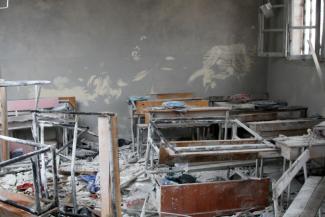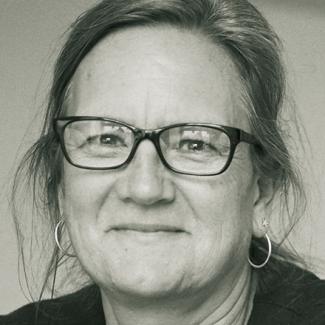Syria
Many dimensions
 AA/picture-alliance/dpa
International campaigns against ISIS are adding to Syrian troubles: this school in Aleppo was destroyed by Russian air strikes.
AA/picture-alliance/dpa
International campaigns against ISIS are adding to Syrian troubles: this school in Aleppo was destroyed by Russian air strikes.
The Syrian turmoil started in 2011 when protests arose against the repressive regime of Bashar al-Assad, writes Samer N. Abboud in his book “Syria”. He is a professor at Pennsylvania’s Arcadia University and is from a Syrian-Lebanese family.
His book describes how Assad increasingly suppressed al kinds of independent political and societal activism. One result was that, when activists rose up, there were no civic options for them to organise and demand political change, he argues. The protests spread all over the country and turned into a decentralised, comparatively unorganised movement. The regime responded by using brutal force and announcing marginal reforms in order to show good intentions. Abboud states that the regime’s stance was obviously unacceptable to the protest movement. Many members of the opposition were forced to leave the country; others took up arms.
However, the attempt to form a political opposition abroad and topple Assad with support from the international community lacked legitimacy in Syria, according to the author. The Free Syrian Army (FSA) was founded by soldiers who had deserted Syria’s armed forces and tried to unite the opposition. Abboud points out that the FAS failed to do so due to disputes over leadership as well as lacking financial and other support. The international community did not agree on any strategy concerning the insurrection, and ever more fighters left the FAS to join more radical and better-equipped extremist militias. Due to support from private persons in the Gulf region, these militias have stronger capacities and provide better social services, Abboud writes.
Other attempts to unite the opposition failed as well. According to Abboud, regional powers such as Turkey, Qatar and Saudi Arabia played a destructive role by turning the Syrian conflict into a proxy war, while countries like Russia and Iran similarly fed the conflict by lending support to Assad. As all of these countries pursue their own geo-strategic interests, the militias they fund fight one another. Abboud’s conclusion is that the initial protest movement was absorbed by a war economy, war politics and cross-border patronage.
As the humanitarian crisis escalates in Syria and the spread of ISIS is causing ever more people to flee, the international community is under increasing pressure to act. In Abboud’s view, however, the tentative attempts to stop the war by holding peace conferences (Geneva I and II) were bound to fail, especially since the international community never managed to involve all relevant conflict parties.
What started as a demand for political change has thus turned into a multi-facetted conflict with international dimensions. Nonetheless, the initial motivations live on, Abboud argues. In his eyes, a new kind of civil society is emerging from mutual support in families and neighbourhoods with Syrian activists assuming many different roles. According to the scholar, some have created new organisations, others are giving the protest movement a voice by working as citizen journalists. Some are contributing to setting up medical services and schools, while others are de facto serving governmental and administrative functions in areas where the Syrian state has collapsed. Such experiences, the professor demands, must be used for the country’s eventual reconstruction.
The more the conflict becomes a proxy war, however, the worse the chances become that Syrians will solve their problems themselves – as they must. According to Abboud, only Syrians can resolve the crisis. Those who want to support a peace process must therefore tackle the conflict’s many dimensions, he states. And the cruel war on civilians must stop as soon as possible.
Dagmar Wolf
Reference:
Abboud, S. N., 2016: Syria. Cambridge: Polity Press.


